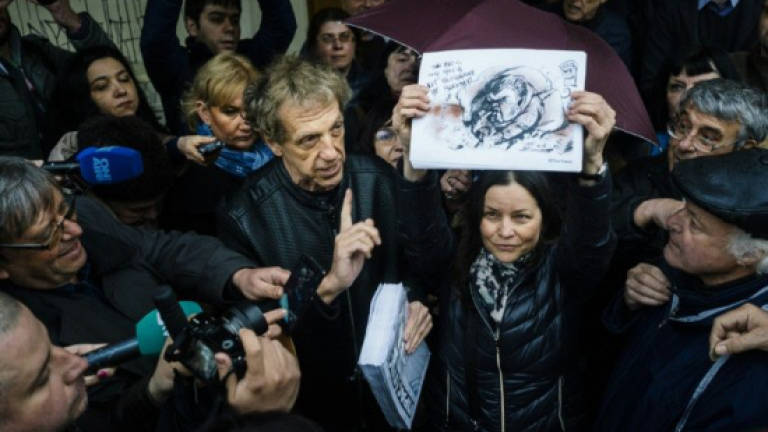Reporters face obstacle run in corruption-hit Bulgaria

SOFIA: Cartoonist Hristo Komarnitski and his colleagues had no illusions: launching a satirical journal was always going to be tricky in Bulgaria, new holder of the EU presidency but also ranked as the bloc's worst press freedom violator.
But they didn't expect that the country's main newspaper distributor, run by a business tycoon MP, would simply block the first issue of their "Prass-Press" journal when it launched in March.
None of the 10,000 copies reached the newspaper stands.
"We had no idea about all the problems that were about to hit us," Komarnitski told AFP.
"There is no alternative for us, no choice ... The (media) situation is going from bad to worse," he added, although Prass-Press continues to appear on the internet and is distributed by hand by volunteers in the provinces.
As Bulgaria prepares to take the rotating EU helm on Jan 1, its press industry is mired in "corruption and collusion between media, politicians, and oligarchs," according to Reporters Without Borders (RSF).
Since joining the bloc a decade ago, Bulgaria has tumbled down in the annual RSF press freedom ranking from sharing the 35th place with France in 2006 to 109th out of 180 countries in 2017 – by far the worst placed EU member state.
Some observers say there is, paradoxically, a correlation between this deterioration and Bulgaria's desire to improve its image as the bloc's poorest and most corrupt country.
Authorities want "Brussels (to) believe that there is progress" in their anti-graft fight and therefore try to muffle investigative journalism, according to opposition newspaper columnist Svetoslav Terziev, who also teaches journalism at Sofia University.
'Chronic' self-censorship
Like in other ex-communist countries, Bulgaria has a large number of media outlets, but ownership tends to be opaque and concentrated in the hands of a few.
"It is like Russian dolls - when you open one, there is another one inside. There is an official owner of the media outlet but everybody knows that it is not the actual owner, there is someone else behind," said Christian Spahr, head of the regional media programme of the German Konrad Adenauer foundation.
Dominating the country's powerful media elite is oligarch Delyan Peevski, the wealthy newspaper distributor who thwarted the launch of "Prass-Press".
The 37-year-old tobacco and construction mogul heads an empire of media outlets, whose actual size remains unknown due to opaque ownership.
According to RSF, he controls nearly 80% of the newspaper distribution.
Peevski is also a favourite target of the "Prass-Press" cartoonists – a fact which may not have played in their favour.
"But we don't go as far as our fellow cartoonists in Britain or France, who are much more brutal," Komarnitski insisted.
Bulgaria's entanglements between political and economic interests have transformed journalism into an obstacle course for reporters.
More than 90% of the Bulgarian journalists polled recently by the Association of European Journalists declared that interference with their work was frequent.
"Self-censorship has become a chronic illness," the study summed up.
'Sicily-style' threats
In 2016, "Prass-Press" cartoonist Chavdar Nikolov saw all his comic strips deleted from the websites of the media group that he worked with, after he depicted Prime Minister Boyko Borisov as chief of a civil militia hunting migrants.
Also last year, television journalists found themselves threatened with sacking by a lawmaker during a live broadcast.
Physical aggression is also common, according to reporters.
Atanas Chobanov from the investigative website Bivol.bg said he and his colleagues were regularly subjected to intimidations "with Sicily-style messages".
The US International Research and Exchanges board (IREX), a non-profit group campaigning for independent press rights, has denounced the "visible political pressure" on leading Bulgarian national media.
It also highlighted the growing impact of so-called truncheons – "tabloid newspapers, online news sites, and television channels used by local oligarchs to exert influence, ruin the reputations of political and business opponents, and manipulate public opinion".
The government uses EU funds earmarked for the press sector as leverage "to make the media benevolent" towards those in power, Chobanov added.
The result: only 10% of the Bulgarians polled in a recent study said they believed in the independence of their media. — AFP